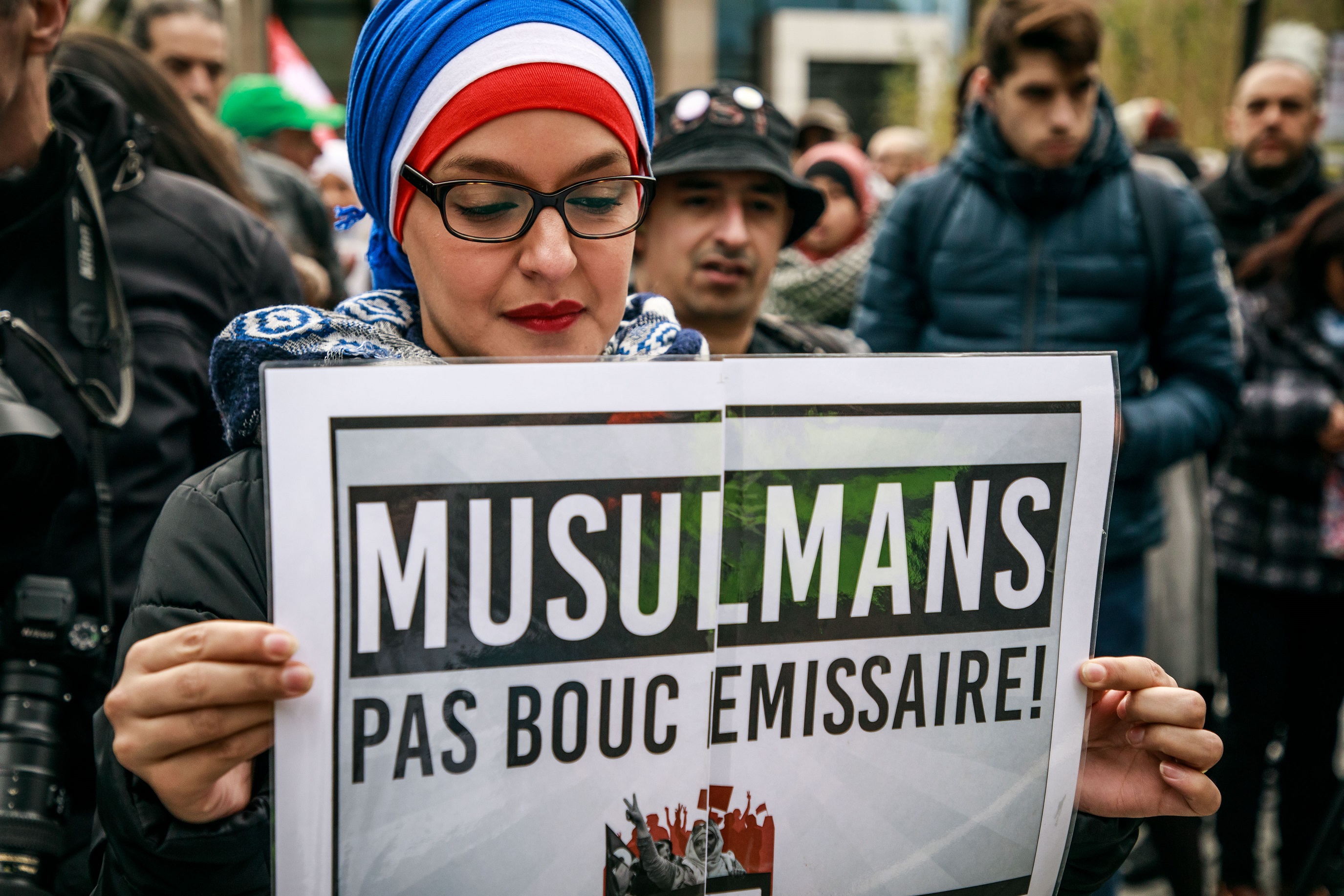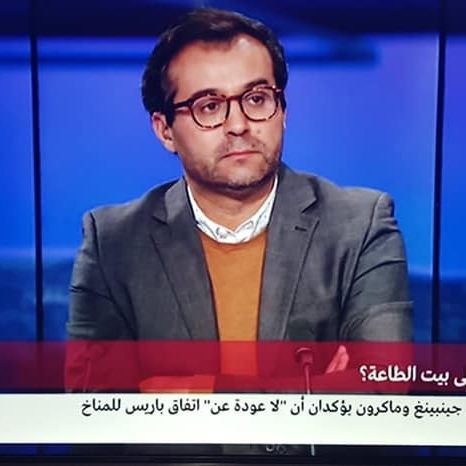نائبة فرنسية مقيدة بسلاسل العبيد في رقبتها!.. بهذه الصورة نشرت أسبوعية "فالور أكتويال" (Valeurs Actuelle) مقالا ورواية بعنوان "دانيال أوبونو في زمن العبودية".
المجلة الفرنسية اليمينية المحافظة اعتادت -في السنوات الأخيرة- على نشر الصفحات الأولى الجدلية والمقالات التي تروج للأفكار العنصرية. غير أنها في عدد آخر أسبوع من أغسطس/آب 2020 تخطت كل العتبات، حيث عبّرت عن ذروة الكراهية والحنين إلى زمن الاستعمار والعبودية، بمقال يتحدث عن الأفارقة حسب الصورة النمطية الأوروبية: أنف مفلطح وشعر مجعد ورجال ونساء عراة يطوفون حول النار، ويعبّرون عن سعادتهم بإلقاء القبض على عدد كبير من الأفارقة، قصد بيعهم للأوروبيين.
من بين الأسرى، شخصية دانيال أوبونو (تمامًا مثل اسم النائبة الفرنسية من أصول أفريقية)، عنقها مكبل بالسلاسل تنتظر عملية البيع، لكنها تنجو بأعجوبة من قبضة البرابرة بفضل شخص فرنسي مسيحي أبيض البشرة. المجلة الفرنسية ذهبت إلى حد تزوير وإنكار التاريخ وإبراء ذمة الأوروبيين ومسؤوليتهم من تهمة الاتجار بالبشر، وإلصاقها بالأفارقة.
مجلة "فالور أكتويال" (وتعني بالعربية: القيم الحالية) اختارت الحديث عن السود بهذه الطريقة، في الوقت الذي يتعاطف فيه ملايين الناس عبر العالم مع مقتل الشباب الأفرو-أميركيين على يد الشرطة، ويخرج فيه آلاف الفرنسيين منددين بالعنصرية ومطالبين بإزالة تماثيل وآثار الاستعمار والرق.
اختيار جنس الرواية الخيالية للحديث عن الواقع، كان مبررًا من ناحية وضع الحديث في خانة الإبداع لتجنب الملاحقة القضائية، وثانيًا للرد على أحزاب اليسار ونوابه بطريقة غير مباشرة، لا سيما حزب اليسار الراديكالي (فرنسا غير المطيعة) الذي يدافع عن شعار مسؤولية فرنسا عن ماضيها الاستعماري، ويندد بالعنصرية النظامية المنتشرة داخل المؤسسات والمجتمع والإعلام على وجه خاص.
وفيما يبدو أنه رد مباشر على دعوات الحزب اليساري، قررت المجلة اليمينية إهانة أبرز نوابه الذين يناهضون العنصرية، وهي دانيال أوبونو ذات البشرة السوداء، ووضع الأغلال في عنقها حتى لا تنسى أنها تنحدر من سلالة العبيد، وأن عليها -بدل الانتقاد- أن تشكر فضل من سمحوا لها بالمساواة وبدخول البرلمان الفرنسي.
هوس مرضي بالإسلام والأقليات
برسم نائبة فرنسية بطريقة مهينة، كانت تعرف المجلة اليمينية أن سمعتها ستتأثر، حيث أجمعت الطبقة السياسية -بمن فيهم الرئيس إيمانويل ماكرون- أنه تصرف عنصري. لكن، هل سيدفع هذا الإجماع المجلة إلى التخلي عن خطها التحريري؟ على العكس من ذلك، فبمجرد انتشار الإدانة والتنديد بالعنصرية، خرجت أقلام وأصوات يمينية لتستنكر القمع والمنع الذي يتعرض له الإعلام "اليميني الجريء" من حملات تشويه تقودها القوى التقدمية من يسار ديمقراطي وليبراليين ومناهضين للعنصرية.
الكتّاب الشباب ضمن طاقم "فالور أكتويال" وصحف ومجلات يمينية أخرى، باتوا من أبرز رواد بلاتوهات التلفزيون الفرنسي "للتعليق والتحليل بطريقة شفافة وصريحة عن الأحداث اليومية". هذا الإعجاب الجماهيري هو ثمرة سنوات من التغطيات الصحفية الجدلية وزوايا التحرير الاستفزازية. فقبل حادثة النائبة أوبونو، تميزت "فالور أكتويال" بصفحة أولى عن نجاة بلقاسم وزيرة التربية السابقة ذات الأصول المغربية، وشبّهتها برجل دين شيعي متطرف، وأنها تشكل خطرا على الأطفال. كما حوكم مالكو المجلة بتهم التحريض على العنصرية والكراهية عندما خصصت ملفًا عن الغجر الروم.
خط تحريري تحريضي، نبرة متحررة ومزايِدة، مواقف راديكالية ومتطرفة عن الهجرة، والأمن، والسلام، وعن كل شيء تقريبًا. هذا هو رأسمال هذه المجلة التي تتحدث باسم اليمين المحافظ، وهناك مثلها العشرات من الصحف والقنوات والبرامج التلفزيونية والإذاعية التي تجاهر بالعنصرية وتفتخر بما تسميه جرأة في الطرح وتحديا "للاستقامة السياسية" السائدة التي تقضي بتجنب الخوض في القضايا الجدلية.
إنه "المذهب الزموري" على حد وصف أحد المعلقين على موجة انحراف فكر النخبة الإعلامية اليمينية ومحاولتها انتهاج طريقة الكاتب "إيريك زمور" وأسلوبه الجدلي الهستيري الذي أصبح مثالا إعلاميا في السعي وراء الإثارة وتكرار المغالطات، والتركيز على الإسلام والأجانب، والتباهي بالعنصرية المتحررة.
العديد من المجلات والأسبوعيات الفرنسية التي ترتبط بأفكار اليمين، تعتمد منذ عقدين من الزمن نفس النهج التخويفي مع المواطنين الفرنسيين؛ بالتركيز على قضايا الإسلام والحجاب والعلمانية. وفي الفترة الأخيرة، أضيفت إليها قضايا الأقليات العرقية. وهذه المنابر الإعلامية لم تعد تتحرّج من تقديم نفسها كوسائل إعلام قومية وطنية، تهتم بالهوية وتعلن أنها إعلام يقول بصوت مرتفع ما يفكر فيه الفرنسي العادي بصوت منخفض.
يمكن إحصاء عشرات العناوين من الصحف والمجلات ومثلها من القنوات والإذاعات التي تروّج لبضاعة اليمين، لكن أبرزها على الإطلاق هي "سي نيوز" التي أصبحت الأكثر متابعة من طرف أنصار الفكر اليميني المحافظ واليمين المتطرف، بفضل برامج الحوار "توك شو" التي تستخدم أسلوب المبالغة والإثارة والتهييج، ويمكن أن تكون متهورة في فترات الذروة، حيث تسعى لاستضافة صحفيين ومحللين من نفس الخط الفكري والتيار السياسي المتطرف، يتقدمهم مذيع مسعور، محدود الثقافتين الخاصة والعامة، دوره "إشعال الحرائق" ومقاطعة الضيوف وإنتاج كلام مبتور، ومحاصرة الضيف بالأفكار النمطية. وفي النهاية، توجيه المشاهد إلى نفس الاستنتاجات المبنية على أفكار مسبقة وتلميحات عنصرية تستهدف الأقليات العرقية أو الدينية.
يكفي أن نذكر أن نسبة متابعة قناة "سي نيوز" تضاعفت في السنتين الأخيرتين، وأن الكاتب إيريك زمور الذي صدرت بحقه أحكام التحريض على العنصرية، بات يشارك في برنامج إخباري يجمع يوميا ما يقارب نصف مليون مشاهد فرنسي، دون نسيان أن العدد قد يتضاعف على مواقع وسائل التواصل الاجتماعي، من خلال النشر المتكرر للمحتوى الجدلي الذي يرد في البرامج.
العنصرية في الإعلام الفرنسي
معظم وسائل الإعلام اليمينية ورد اسمها في تقرير اللجنة الفرنسية الاستشارية لحقوق الإنسان، التي قدمت لرئيس الوزراء في يونيو/حزيران 2020 تقريرا حول العنصرية وكراهية الأجانب للعام 2019، حيث طرحت اللجنة أسئلة حول مسؤولية وسائل الإعلام في انتشار خطاب الكراهية.
مقررو اللجنة دقوا ناقوس الخطر وأكدوا أن "الخطاب العنصري تحرر في وسائل الإعلام الفرنسية وصار عاديًّا وغير صادم"، وأشاروا إلى أن المنابر التي تقدم مواقف قومية وحمائية أو تقدم محتوى إعلاميا له علاقة بالهوية والسيادة ويتحدث بطريقة سلبية عن المهاجرين وعن المسلمين والعرب أو ينتقد المثليين، تلقى متابعة كبيرة وانتشارًا واسعًا.
اللجنة الفرنسية لحقوق الإنسان حمّلت وسائل الإعلام مسؤولية تفشي الخطاب العنصري من خلال استضافة وإعادة استضافة نفس الأشخاص "الجدليين" الرجعيين، ومن خلال سلبية الصحفيين المحاورين، وعدم إلمامهم بالمواضيع، وعدم رفض التلميحات العنصرية، وعدم الرد على المعلومات الخاطئة أو على الأقل التشكيك فيها. وهكذا تقول اللجنة إن ذلك يعطي الانطباع لدى مستهلك الأخبار؛ بأن الكلام قد يكون صحيحا ومعقولا. وبالتالي، رويدا رويدا، تساهم هذه الوسائل الإعلامية التي يملكها رجال أعمال لديهم أجندات سياسية متطرفة؛ في شرعنة الخطاب العنصري وجعله عاديا ومتقبلا داخل المجتمع.

العلبة السوداء للفكر المتشدد
من المؤكد أن مجلة "فالور أكتويال" اعتادت طرح القضايا الجدلية، لكن في هذه المرة أخذت قضيتها اتجاهًا خطيرًا، حيث فتحت النيابة العامة تحقيقا في تهم "السب ذي الطابع العنصري"، بينما اتصل الرئيس ماكرون بالنائبة أوبونو وعبّر لها عن دعمه ورفضه لكل أشكال العنصرية. كما أن بعض القراء استغربوا سقوط المجلة في فخ العنصرية وقالوا إنها عملت على مدى سنين لتتنصل من تهم الترويج للفكر اليميني المتطرف، ولتنصّب نفسها صوت اليمين المحافظ ذي الخلفية المسيحية، لكنها أفسدت كل هذا ولم تستطع الحفاظ على الخيط الرفيع الذي يفصل اليمين المحافظ بأقصى اليمين.
الرئيس إيمانويل ماكرون الذي يقدم نفسه كحداثي تقدمي، كان أول رئيس فرنسي يدلي بحوار مطول لمجلة ذات سمعة متطرفة، وقد جلب له هذا العديدَ من الانتقادات حول جدوى اختياره لمجلة مثل "فالور أكتويال"، حيث تحمّل الرئيس المسؤولية وقال "إن ما تكتبه المجلة مهم لمعرفة فكر اليمين". وقد قفز الحوار بالمبيعات لتصل إلى 80 ألف نسخة أسبوعيًّا، وأعطى المجلة مشروعية ومصداقية لدى المواطنين.
لا يكفي القول بأن أسباب نجاح "فالور أكتويال" وغيرها من وسائل الإعلام المحافظة، مرده إلى الانعطافة اليمينية للسياسة الفرنسية، بل يكمن في أن إستراتيجية هذه المؤسسات الإعلامية التي تسيطر عليها شركات خاصة، لها علاقة بالتسويق أكثر من علاقتها بالصحافة وأخلاقيات المهنة.
إنه لقاء بين إستراتيجية ربحية تركض وراء استقطاب أكبر عدد من القراء والمشاهدين، وبين إستراتيجية متطرفة في طرح الزوايا الخلافية والآراء غير العادية التي تثير الجدل.
"فالور أكتويال" تبدو تجسيدًا إعلاميًّا لتغييرات عميقة شهدتها الساحة الفرنسية، وربما الغربية بصفة عامة، وتغييرا في طريقة ممارسة الصحافة. فالطبقة السياسية تبدو رهينة لهذا الإعلام الجديد الذي يضخ أموالا طائلة ويرمي بثقله في السياسة لتوجيه الرأي العام، حيث أصبح قادرًا على ترجيح كفة الانتخابات، مثلما حدث مع الرئيس الأميركي دونالد ترامب.
في الوقت الراهن بفرنسا، يوظف السياسيون بمختلف اتجاهاتهم، عبارات "التوحش" و"الانفصالية الإسلامية" و"الأهالي" و"العنصرية ضد البيض"، وهي كلها عبارات استخدمتها أولا النخبة التي تكتب أو تحلل في وسائل الإعلام اليمينية الشعبوية.
الاعتماد على الإثارة والمواضيع الجدلية والابتعاد عن التغطية التي تلتزم بالمعايير المهنية، تبدو "الموضة" الحالية للإعلام الشعبوي -أو ما يسمى إعلام الرأي- الذي يروج لأفكار وتيارات سياسية معينة. وقد باتت هذه الإستراتيجية تضغط حتى على وسائل الإعلام التقليدية التي تعتمد على المصداقية والحياد. وقد أدت المنافسة إلى سقوط بعض المؤسسات الكبرى في فخ السباق على الخبر، بيد أن الأمل يبقى معلقا بالصحف الاستقصائية مثل "ميديا بارت" التي تمكنت من أن تكون "سلطة إعلامية مضادة" تعتمد التحري والتأني في معالجة الأخبار.
ما تزال صحف عدة مثل "لوموند" و"ليبراسيون" تقاوم هذا المد الشعبوي، وهاجر الكثير من الفرنسيين إلى وسائل الإعلام التقليدية بحثا عن التحليل المحايد والفهم المعمق للقضايا التي يوظفها اليمين بكثير من الخبث.












![Palestinian journalists attempt to connect to the internet using their phones in Rafah on the southern Gaza Strip. [Said Khatib/AFP]](/sites/default/files/ajr/2025/34962UB-highres-1705225575%20Large.jpeg)




























